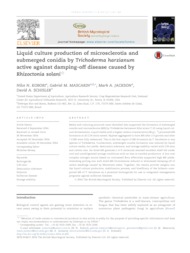Liquid culture production of microsclerotia and submerged conidia by Trichoderma harzianum active against damping-off disease caused by Rhizoctonia solani.
Liquid culture production of microsclerotia and submerged conidia by Trichoderma harzianum active against damping-off disease caused by Rhizoctonia solani.
Author(s): KOBORI, N. N.; MASCARIN, G. M.; JACKSON, M. A.; SCHISLER, D. A.
Summary: Media and culturing protocols were identified that supported the formation of submerged conidia and microsclerotia (MS) by Trichoderma harzianum Rifai strain T-22 using liquid culture fermentation. Liquid media with a higher carbon concentration (36 g L -1) promoted MS formation at all C:N ratios tested. Hyphae aggregated to form MS after 2 d growth and after 7 d MS were fully melanized. This is the first report of MS formation by T. harzianum or any species of Trichoderma. Furthermore, submerged conidia formation was induced by liquid culture media, but yields, desiccation tolerance, and storage stability varied with C:N ratio and carbon rate. Air-dried MS granules (<4 % moisture) retained excellent shelf life under cool and unrefrigerated storage conditions with no loss in conidial production. A low-cost complex nitrogen source based on cottonseed flour effectively supported high MS yields. Amending potting mix with dried MS formulations reduced or eliminated damping-off of melon seedlings caused by Rhizoctonia solani. Together, the results provide insights into the liquid culture production, stabilization process, and bioefficacy of the hitherto unreported MS of T. harzianum as a potential biofungicide for use in integrated management programs against soilborne diseases.
Publication year: 2015
Types of publication: Journal article
Unit: Embrapa Rice & Beans
Observation
Some of Embrapa's publications are published as ePub files. To read them, use or download one of the following free software options to your computer or mobile device. Android: Google Play Books; IOS: iBooks; Windows and Linux: Calibre.
Access other publications
Access the Agricultural Research Database (BDPA) to consult Embrapa's full library collection and records.
Visit Embrapa Bookstore to purchase books and other publications sold by Embrapa.

